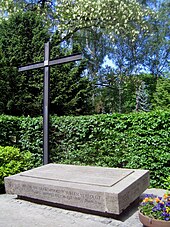Rudiger Schleicher

Rüdiger Schleicher (born January 14, 1895 in Stuttgart ; † April 23, 1945 near the Lehrter Strasse cell prison in Berlin ) was a German lawyer , pioneer of air law and resistance fighter against National Socialism .
Life
Schleicher came from an old Württemberg family, his grandfather Friedrich von Rüdinger was president of the royal upper government. Rüdiger Schleicher was married to Ursula Bonhoeffer (* 1902, † 1983), a daughter of Karl Bonhoeffer and sister of Dietrich and Klaus Bonhoeffer .
Schleicher studied law and received his doctorate in 1923 with a dissertation on international aviation law in Tübingen , where he became a member of the Igel Academic Association . After working in the Württemberg state service and in the German-American Arbitration Commission in the Foreign Office, he became an official in the Reich Ministry of Transport in 1927 . In 1933 he was transferred to the newly established Reich Aviation Ministry. There he headed the legal department from 1935 as a ministerial advisor. On August 14, 1939, two weeks before the start of the war, Schleicher was replaced as head of the legal department by Christian von Hammerstein and transferred to a position as a consultant in the General Aviation Office. The government rejected his advocacy of the rules of international law , the Pact against War ( Briand-Kellogg Pact ) and the Hague Land Warfare Regulations in publications and lectures. In 1939, Schleicher also took over as honorary professor as head of the Institute for Aviation Law at the Technical University of Berlin and the publication of the magazine Archive for Aviation Law . The institute was subsequently used for conspiratorial meetings of the resistance.
If the assassination attempt on July 20, 1944 was successful , Schleicher would be responsible for reorganizing aviation. After the failure of the assassination attempt, Schleicher declared during interrogation that he was against the Nazi regime . In order to achieve a compromise with the western opponents of the war, Hitler had to resign.
On February 2, 1945, Schleicher was sentenced to death by the People's Court under the chairmanship of Roland Freisler. Freisler died a day later during an American air raid when he was hit by a fragment of a bomb on his way to the basement of the People's Court. Ironically, the doctor called from the street, who could only determine Freisler's death, was Schleicher's brother.
With twelve other prisoners, including his brother-in-law Klaus Bonhoeffer , his assistant Hans John and Friedrich Justus Perels , Schleicher was shot on the night of April 22nd to 23rd, 1945. He found his final resting place in the Dorotheenstädtischer Friedhof in Berlin. A plaque with the inscription “He died for freedom and justice” commemorates him on the Rüdinger / Schleicher family grave in the Prague cemetery in Stuttgart.
The comment he gave on the Aviation Act (1933, 2nd edition 1937) was continued after his death (Schleicher / Reymann / Abraham: Das Recht der Luftfahrt , 3rd edition 1960/1966).
literature
- Karl Dietrich Bracher : History as Experience. Considerations on the 20th century ; Deutsche Verlags-Anstalt, Stuttgart a. a. 2001; ISBN 3-421-05444-4 . (Like Eberhard Bethge , Bracher is a son-in-law of Rüdiger Schleicher. The work, which combines several of Bracher's essays, includes a short biography of Schleicher.)
- Uwe Gerrens: Rüdiger Schleicher - Life between civil service and conspiracy ; Gütersloher Publishing House, Gütersloh 2009; ISBN 978-3-579-08037-6 .
Web links
- Tobias Rieger: Resistance in the Reich Ministry of Aviation. Rüdiger Schleicher and July 20 , online: Officials of the National Socialist Reich Ministries , January 3, 2020.
- Short biography - project "Officials of National Socialist Reich Ministries"
- Literature by and about Rüdiger Schleicher in the catalog of the German National Library
- Short biography of the German Resistance Memorial Center
Individual evidence
- ↑ Press release of the University of Tübingen ( Memento of February 4, 2012 in the Internet Archive ), mentioned at the end of the communication, November 25, 2003.
- ↑ Joachim Fest : Coup. The long way to July 20th. Berlin 1994, ISBN 3-88680-539-5 , p. 317 f.
- ↑ See Joachim Fest: Coup. The long way to July 20th. Berlin 1994, ISBN 3-88680-539-5 , p. 320.
| personal data | |
|---|---|
| SURNAME | Schleicher, Rudiger |
| BRIEF DESCRIPTION | Resistance fighters against National Socialism |
| DATE OF BIRTH | January 14, 1895 |
| PLACE OF BIRTH | Stuttgart |
| DATE OF DEATH | April 23, 1945 |
| Place of death | Berlin |
